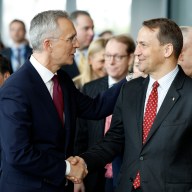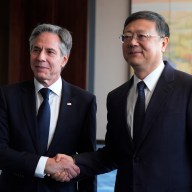SANTA ANA, California – A Chinese-born engineer was convicted Thursday of stealing trade secrets critical to the U.S. space program in the nation’s first economic espionage trial.
A federal judge found former Boeing Co. engineer Dongfan “Greg” Chung guilty of six counts of economic espionage and other charges for hoarding 300,000 pages of sensitive documents in his home, including information about the U.S. space shuttle and a booster rocket.
“The trust Boeing placed in Mr. Chung to safeguard its proprietary and trade secret information obviously meant very little to Mr. Chung,” U.S. District Judge Cormac J. Carney wrote in his 31-page ruling. “He cast it aside to serve the PRC (People’s Republic of China), which he proudly proclaimed as his ‘motherland.”‘
Federal prosecutors accused the 73-year-old stress analyst of using his 30-year career at Boeing and Rockwell International to steal the documents. They said investigators found papers stacked throughout Chung’s house that included sensitive information about a fueling system for a booster rocket – documents that Boeing employees were ordered to lock away at the close of work each day. They said Boeing invested $50 million in the technology over a five-year period.
The judge convicted Chung of six counts of economic espionage, one count of acting as a foreign agent, one count of conspiracy and one count of lying to federal agents. He was acquitted of obstruction of justice.
Chung was handcuffed and taken into federal custody following the ruling. He is set to be sentenced Nov. 9.
Federal prosecutor Ivy Wang said Chung could face a maximum sentence of more than 90 years in prison.
“I hope that one of the messages that goes out is if someone is going to steal proprietary information and steal that information for the benefit of another country, they are going to be charged in this country and face very serious punishment for doing so,” Wang said after the ruling.
Chung opted for a non-jury trial that ended June 24. During the 10-day trial, defence attorneys said Chung was a “pack rat” who hoarded documents at his house but insisted he was not a spy.
They said Chung may have violated Boeing policy by bringing the papers home, but he didn’t break any laws and the U.S. government couldn’t prove he had given any of the information to China.
After the ruling, defence attorney Thomas Bienert said he planned to appeal.
“A big feature (of this case) is not about what China wanted Mr. Chung to do, but about what Mr. Chung was willing to do,” Bienert said outside the courtroom. “There is no evidence that China used or benefited from anything in this case.”
Chung had been free on $250,000 bail before the verdict. His attorneys asked the judge to let him remain with his family in Orange until sentencing, but the government said a man facing such a long sentence with close ties to China could easily flee to the Chinese consulate and never return.
The Economic Espionage Act was passed in 1996 to help the government crack down on the theft of information from private companies that contract with the government to develop U.S. space and military technologies.
The legislation became a priority in the mid-1990s when the United States realized China and other countries were targeting private businesses as part of their spy strategy.
Since then, six economic espionage cases have settled before trial. Another is set for trial in U.S. District Court in San Jose this year.
Chung worked for Rockwell International until it was bought by Boeing in 1996. He stayed with the Chicago-based company until he was laid off in 2002. After the Columbia space shuttle disaster in 2003, Chung was brought back as a consultant. He was fired when the FBI began its investigation in 2006.
The government believes Chung began spying for the Chinese in the late 1970s, a few years after he became a naturalized U.S. citizen and was hired by Rockwell.
Prosecutors said they discovered Chung’s activities while investigating another suspected Chinese spy, Chi Mak. Mak was convicted in 2007 of conspiracy to export U.S. defence technology to China and sentenced to more than 24 years in prison.
Mak was not charged under the Economic Espionage Act.
















